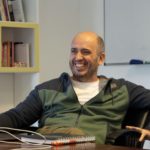When it comes to making choices (both personal and professional), it can feel like navigating a maze. We often wonder if we should take the road less traveled or stick to the tried and tested strategies to achieve the goals we’re after, and can even consider sacrificing a little comfort now for a bigger payoff down the road. What should we do?
Well, from my experience, it’s not so much about picking our actions correctly as it’s about asking ourselves the right questions. Doing this simple -yet complex- act is what sets apart decisions we need to make from decisions we’ll celebrate taking. And the more trained we are in asking ourselves the right questions, the easier they will be to spot. That’s why I’ve defined 4 key questions for decision-making that we use regularly at Arionkoder, and that maybe you can use too:
- Will this decision help us be more data-driven? If this decision will steer us towards the direction of transparency and evidence-basing, it’s a good one. Making decisions based on data not only keeps us honest and accountable, but also helps us see the big picture and understand our impact.
- Will this decision keep us ahead of the game? We’re not ones to follow the crowd blindly. So, any decision that pushes us forward, in a direction we understand to be aligned with our purpose, we’re all for it.
- Will this decision accelerate our sales? It’s simple math. The more sales we make, the more fuel for impact we’ll have, and that’s what our purpose guides us towards.
- Will this decision make us smarter? We’re all about learning and growing. If a decision helps us gain more knowledge and insight, count us in, because it will positively affect our relationship to our clients, ecosystem and even the future itself.
Now, let’s talk about one decision that ticks all these boxes: The Flow. It’s our operational model, a way of doing things differently that looks to tear down silos and promote collaboration like never before. We’ve talked about it, but let’s recap some key ideas of The Flow.
In this model, fluidity is key. It’s what’s going to make us a nimble and unperishable organization, and it all comes down to leaving our egos at the door. When we do that, communication flows better —whether it’s internal or external— helping us all become storytellers, guiding companies, arionics, and our community as they shape their next chapter. We tear down communicational silos, ensuring that we all know what one of us knows. In The Flow, everyone’s voice counts, no matter their job title, because it’s not about who you are, but what you bring to the table for our purpose. This model is also future-proof, ensuring we’re ready for whatever comes our way. We’re always looking for ways to get better, smarter, and easier to use, and that’s what will make us stay in the fast lane.
Does The Flow help us be data driven? Yes. Or, better said, it forces us to, because data becomes a key element to see the big picture, and to enhance internal communication backed by factual information. Data is paramount when it comes to tearing down those communicational silos.
What about keeping us ahead of the game? Of course. The Flow changes the status quo of operational models in a vanguardist way. This might mean we need to make an extra effort towards creating understanding around this, but we believe it’s worth it to become future-proof.
Will our sales be accelerated by this model? No doubt. Our collaborative information-sharing means we’re better prepared to understand what our clients need, to be intimately familiar with our success stories and how they’ve helped others, and overall to propose the solutions that will make a bigger impact for our clients.
Does this mean we become smarter? Absolutely. The Flow is inspired by biology, by resilient beings that adapt to the environment around them to thrive and grow. And interacting in the ways that The Flow suggests ensure we’re almost a living organism with the ability to transform itself into better versions of ourselves constantly.
Of course, shaking things up like this comes with its challenges, especially related to adoption and generation of consistency across the board. But we’re working on it, both internally and externally to ensure everyone sees the value in what we’re doing.
You know, I like to think that Arionkoder is a reflection of my own mind—always experimenting, always pushing the boundaries. And those experiments will fail sometimes, but that’s all part of the journey. We fail fast and continue searching for better alternatives, and we’re not afraid to be vulnerable and share what we’re doing with the world because that’s part of what makes us genuine.
So, here’s my invitation to you: dare to experiment. Embrace those failures. Because that’s how we grow, that’s how we become resilient and ready to face the future. And this consistency is what will help you find truly groundbreaking along the way.
Ready to take the leap?
